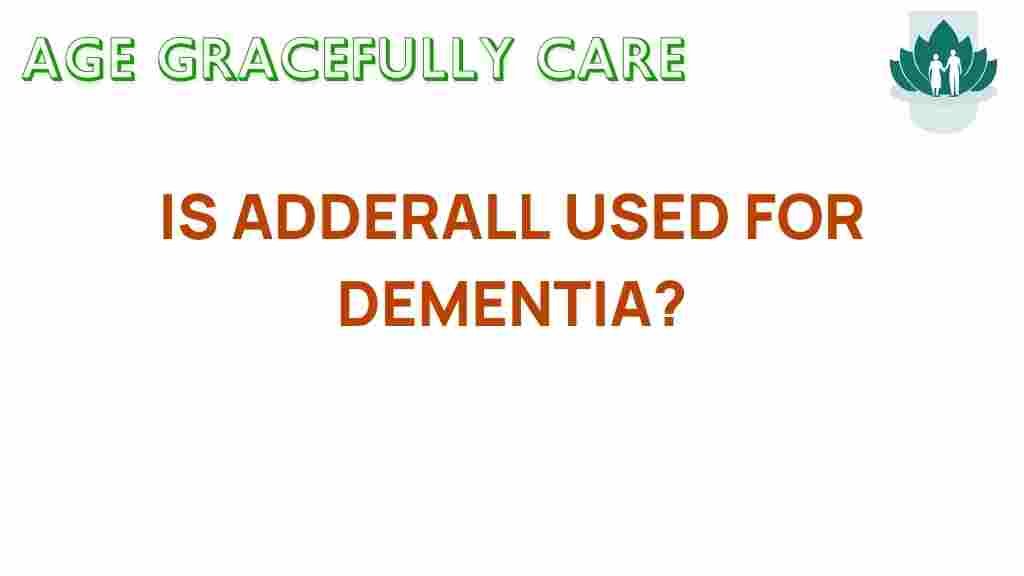Unraveling the Mystery: Is Adderall Effective for Dementia?
Dementia is a complex and often misunderstood set of symptoms affecting memory, thinking, and social abilities severely enough to interfere with daily life. As the population ages, the prevalence of dementia continues to rise, leading to increased interest in treatment options that can potentially enhance cognitive function and slow decline. One such pharmaceutical that has garnered attention is Adderall, primarily known as a stimulant medication used to treat Attention Deficit Hyperactivity Disorder (ADHD). This article delves into the potential effectiveness of Adderall for dementia, exploring its role in cognitive enhancement, treatment options, and its implications for mental health in aging populations.
Understanding Dementia and Its Challenges
Dementia encompasses various neurodegenerative disorders, including Alzheimer’s disease, vascular dementia, and Lewy body dementia. These conditions are characterized by progressive cognitive decline, memory loss, and changes in behavior and personality. Addressing dementia presents unique challenges:
- Progressive Nature: Dementia symptoms often worsen over time, leading to increased care needs.
- Varied Symptoms: Different types of dementia exhibit different symptoms, complicating diagnosis and treatment.
- Impact on Mental Health: Individuals with dementia may also experience anxiety and depression.
What is Adderall?
Adderall is a prescription medication that combines amphetamine and dextroamphetamine, both of which are stimulants that affect chemicals in the brain and nerves contributing to hyperactivity and impulse control. Primarily prescribed for ADHD, Adderall has also been explored for other uses, including potential cognitive enhancement in older adults. But how does it stack up against dementia?
The Mechanism of Action: How Adderall Works
Adderall enhances the levels of neurotransmitters, particularly dopamine and norepinephrine, in the brain. This increase can lead to improved attention, focus, and cognitive performance. Here’s how it may relate to dementia:
- Neurotransmitter Activity: By boosting dopamine levels, Adderall may help counteract some cognitive deficits associated with neurodegenerative disorders.
- Increased Alertness: It may enhance mental alertness, which can be beneficial for individuals experiencing cognitive decline.
Adderall and Cognitive Enhancement in Dementia
The question arises: Can Adderall be effectively used as a treatment option for dementia? Research on this topic is still emerging, but some studies suggest potential benefits:
- Short-Term Cognitive Benefits: Some individuals with dementia may experience short-term cognitive enhancements when using stimulants like Adderall.
- Improved Attention and Focus: For those with mild cognitive impairment, Adderall may help improve attention span and focus.
Current Research on Adderall and Dementia
Research on the effectiveness of Adderall for dementia is limited but growing. Some studies indicate that:
- Stimulants and Cognitive Function: A few small-scale studies have explored the impact of stimulants on cognitive function in elderly patients with dementia.
- Mixed Results: While some report improvements in attention and cognitive performance, others find little to no benefit.
For instance, a study published in Journal of Neuropsychiatry and Clinical Neurosciences highlighted the need for larger, more comprehensive trials to assess the efficacy and safety of Adderall in dementia patients.
Risks and Considerations
Despite potential benefits, using Adderall for dementia is not without risks:
- Side Effects: Common side effects of Adderall include insomnia, anxiety, and elevated heart rate, which may be particularly concerning for older adults.
- Potential for Abuse: As a controlled substance, there is a risk of misuse, especially among individuals with cognitive impairments.
- Drug Interactions: Adderall may interact with other medications commonly prescribed to dementia patients, necessitating careful monitoring.
Alternative Treatment Options for Dementia
Given the complexities surrounding the use of Adderall for dementia, it’s vital to explore alternative treatment options:
- Cholinesterase Inhibitors: Medications like donepezil and rivastigmine may help manage symptoms of Alzheimer’s disease.
- Memantine: This medication is used to treat moderate to severe Alzheimer’s disease by regulating glutamate activity.
- Non-Pharmacological Approaches: Cognitive therapies, physical exercise, and social engagement can also play significant roles in managing dementia.
Consulting with Healthcare Professionals
If you or a loved one is considering Adderall as a treatment option for dementia, consulting with healthcare professionals is crucial. Here are steps to take:
- Comprehensive Evaluation: Get a thorough cognitive assessment to determine the type of dementia and appropriate treatment.
- Discuss Medications: Talk about all current medications and potential interactions with Adderall.
- Monitor Progress: If prescribed, regular follow-ups to assess cognitive changes and side effects are essential.
As we unravel the mystery surrounding the use of Adderall for dementia, it’s clear that while there may be some potential for cognitive enhancement, the risks and uncertainties associated with its use warrant careful consideration. With the aging population facing increasing rates of neurodegenerative disorders, exploring pharmaceuticals like Adderall opens a dialogue about innovative treatment options.
Ultimately, a multi-faceted approach that includes medication, lifestyle changes, and supportive therapies may offer the best pathway for enhancing mental health and quality of life in individuals with dementia. If you’re seeking more information on cognitive health and treatment options, consider visiting Alzheimer’s Association for resources and support.
In conclusion, while Adderall might hold some promise for individuals with dementia, it is critical to weigh the potential benefits against the risks and to consult healthcare providers to navigate this complex landscape effectively.
This article is in the category Health and created by AgeGracefullyCare Team
